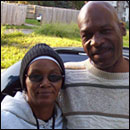Navigating in Nebraska
AUGUST 25, 2007 Listen to this Story

- Nebraska
- View the Slideshow
Web Resources
- The Red Cross: Means to Recovery
- Reaching Out Nebraska: The final evaluation report by a FEMA-funded crisis counseling program for evacuees in Nebraska.
- Interchurch Ministries of Nebraska: A quarterly report by a case management group assigned to evacuees in Nebraska.
- The Little Town Behind Them: A blog by Lawrence Lanahan
- The Investigative Fund of The Nation Institute
Two years ago, 166 Hurricane Katrina evacuees from New Orleans ended up in Omaha, Neb., and most of them have decided to stay. Building a new life is never easy, but it's especially difficult when you have to deal with various bureaucracies. Producer Lawrence Lanahan brings us a story about one man's mission to help himself by helping other evacuees get back on their feet.
Notes from Producer Lawrence Lanahan
After Hurricane Katrina, I wondered what the psychological implications of the disaster would be. According to one federal estimate, a quarter of Katrina survivors will have "clinically significant" mental health problems, and 10 to 20 percent more will need some degree of psychological assistance.
FEMA gave out emergency 60-day "crisis counseling grants" to many of the states that took in evacuees. This was to be followed up with a nine-month grant. Nebraska's follow-up grant came in four months late. While they were waiting, I heard about the evacuees in Omaha,the last to leave New Orleans, rounded up by the National Guard 12 days after the flood and put on a plane with no idea where they were going. And I heard many of them were in bad shape before the storm. One psychologist in Omaha said that at least half of this group had pre-existing mental health issues. The most common diagnosis was post-traumatic stress disorder coupled with depression, played out through nightmares, fear, panic attacks, and angry outbursts.
I heard about one evacuee who was running around like crazy trying to counsel his fellow evacuees, take them to appointments, and help them with paperwork. It was Bobby Leonard. When the follow-up crisis counseling grant finally came in, the state hired Bobby as an outreach worker. I started talking with him in the spring of 2006, just after he got hired.
In August 2006, the Investigative Fund at The Nation Institute very generously decided to fund me for a three-week reporting trip to Omaha. It was a strange trip -- my grandmother died a week after I got there. I flew home for the funeral, and 24 hours later I was back in Omaha. She had been suffering for a long time, but she was 94, she had good health care, and she had her family around during her last days. The contrast with the complete lack of dignity in which Hurricane Katrina victims died, and the scattering of the families who lived, was impossible to ignore.
The storm was a crucible for many problems in this country that the more fortunate among us don't necessarily like to deal with. It is no less shocking, disturbing or relevant today than it was on August 29, 2005. I am grateful to the evacuees for letting me into their worlds, and to Weekend America for sharing their stories.
Bobby Leonard is trying to launch a non-profit called Katrina Survivors in Nebraska. If you'd like to know more, you can call him directly at 402-812-6878.Extra Audio
Hear an interview with evacuee Glenn Laugand. (5:37).
Hear an interview with evacuee Frank Henry. (5:37).
Hear an interview with evacuee Kittye Ellis. (5:37).
-
- Music Bridge:
- So Many Ways
- Artist: Metamatics and Norken
- CD: My Favorite KInd of Irrelevance (Hydrogen Dukebox)







Comments
Comment | Refresh
Post a Comment: Please be civil, brief and relevant.
Email addresses are never displayed, but they are required to confirm your comments. All comments are moderated. Weekend America reserves the right to edit any comments on this site and to read them on the air if they are extra-interesting. Please read the Comment Guidelines before posting.
You must be 13 or over to submit information to American Public Media. The information entered into this form will not be used to send unsolicited email and will not be sold to a third party. For more information see Terms and Conditions and Privacy Policy.